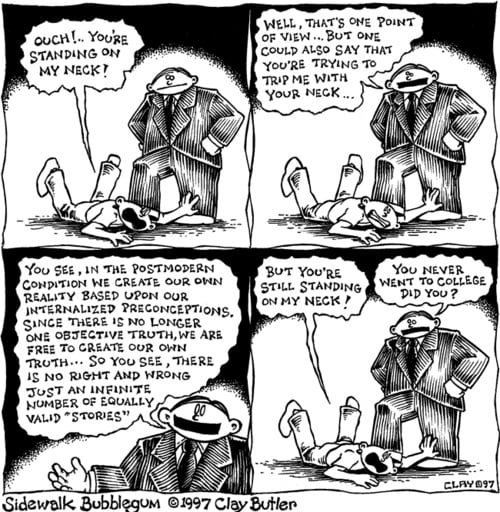This is for those who know what “death of the author” means or who is willing to look it up, but in short, it can summed up to mean “whatever a work of fiction means is up to the people to decide on”.
Question inspired by an incident the other day where I saw someone one day cite “death of the author” when asked why he went into the womens’ bathroom, saying “you keep saying the symbol on the door is a stick figure in a dress, but I look at it and see a stick figure in a cape, and so I entered because I’m super.”
It’s also commonly used the other way around: whatever the artist believed does not invalidate the art. For example, if Beethoven had been a Nazi, it wouldn’t take away from his work.
It’s an interesting question in a lot of ways, and I think it’s a spectrum and there’s no absolute answer. For example, does Kevin Spacey’s off screen behavior invalidate his work in The Usual Suspects? On the other hand, it’s clear that Ayn Rand’s beliefs are clearly expressed in Atlas Shrugged, and it’s easy to see the expression of (some) directors’ politics, or perversions, in the films they make; at what point does it stop being art and become propaganda, such as Triumph of the Will?
Those are all interesting questions that, like you said, generally do not admit clear answers.
For art, maybe there is a related question. Should analysis of an art piece (be it text, music, visual, etc.) also analyze the artist, or, put another way, is understanding the artist important to understanding their art? I, personally, like to say that the artist, in general, usually distracts from the art. But this is in many cases untrue.
There’s also the financial aspect; Does supporting the art also support an artist you don’t agree with? JK Rowling is a good example; She’s a horrible bigot, who penned the single most wildly popular book series in living memory. She made over a billion dollars on Harry Potter, all while being a bigot. So it’s worth asking whether supporting the art is a moral choice, even if we’re using Death of the Artist.
Yes, and that’s a very good point. She’s a particularly good example, because her bigotry wasn’t widely known or expressed until she was done with the series. It raises the question: was it ethical to buy all of those novels before it became public that she’s a racist piece of shit? If so, why would the exposure of that information change the books? The only argument against buying the books is the one of boycotting.
Scott Adams is another one. The fact that he’s a pathetic excuse for a human being was only widely known around the time he stopped publishing.
I admit, I struggle with this issue more than most. I greatly admire Kevin Spacey’s acting, and the controversy broke my heart. I mean, we’re all shitty humans who’ve made mistakes and done shitty things to other people. Some things cross a line, and ideological sins are not forgiveable.
if Beethoven had been a Nazi, it wouldn’t take away from his work.
It would have made him more impressive in my eyes, as he would have had to have been able to see the future, or time travel!
Which is the why of picking Beethoven rather than a contemporary or post-WWII artist: so as to not digress into an uninteresting debate about whether Hitler liked Wagner because Wagner was an anti-Semite (which he was, among other things). I tried for a relatively uncontroversial figure with no relation to Naziism by sheer fact of predating the movement and no other association.
It doesn’t matter what he sees. We as society have constructed that meaning. He knows it and is just an asshole. If he wants to change that meaning, he has to convince others to adopt that meaning and not just do what he wants.
This has nothing to do with the death of the author or post modernism, but people who get all twisted about have been saying this for sixty years now. Here’s a thirty year old example of missing the point.

I came here for hilarious answers, not an informative discussion about the meaning of “death if the author” damn it!
Agreed. I didn’t come here to learn, dammit! Where are my shits and giggles? Where? WHERE?

